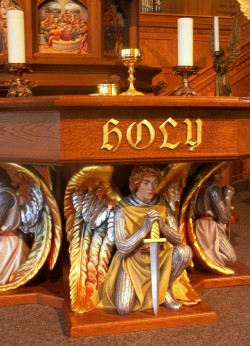(One of the goals of Brothers of John the Steadfast is to train the Brothers in good practice and theology. This article is one in a series that teaches about the liturgy.
These articles were initially intended to be put into bulletins or read during the service to educate the laity on the different parts of the service. They were therefore purposefully made short. Please use the comment section or email us to help us expand the series as appropriate, giving more information about each part of the liturgy.)
Notes on the Liturgy #3 — Confession
After the Invocation, we move to the confession. When we approach the most holy Lord  in worship, it is appropriate that we confess our sins to Him and seek His forgiveness in absolution. We are reminded that sinful people only stand before God through the merits of Christ never by our own goodness. Indeed, the confession puts the hard truth of our situation plainly, “We are by nature sinful and unclean,” or “I a poor, miserable sinner.”
in worship, it is appropriate that we confess our sins to Him and seek His forgiveness in absolution. We are reminded that sinful people only stand before God through the merits of Christ never by our own goodness. Indeed, the confession puts the hard truth of our situation plainly, “We are by nature sinful and unclean,” or “I a poor, miserable sinner.”
Note, the confession isn’t a confession of the sin of the day as if our problem wasn’t so bad so that with the proper amount of effort we could improve ourselves. Confession speaks to the heart of our problem. We are totally corrupt before God without Christ. We have no power to correct our problem because the heart of the human problem is the problem of the human heart. Christianity is not a self improvement program. It is about God doing for us what we cannot do for ourselves.
It is worth noting that when the Lutheran Confessions speak of Confession and Absolution they are primarily referring to private confession. Unfortunately this is not practiced in Lutheran churches as it once was, yet it is still available today (see LSB pg 292 or LW pg 310). You may contact your Lutheran pastor to set up a time for private confession. He is bound by oath not to reveal that which is spoken to him in the context of private Confession.
Notes on the Liturgy —
Introduction
Invocation
Confession
These notes were originally written in 2001 by Pastor David Oberdieck and have been edited.